The Grain Controversy: Should We Eat Them or Not?
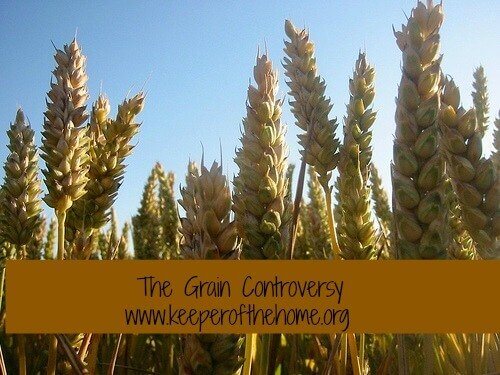
Written by Kate Tietje, Contributing Writer
Are you working to ditch processed foods and put more real food on the table? This month we’re running a series called Real Food Made Simple: A Beginner’s Guide to Eating Better. Our goal is to answer the questions you might have and make the transition a whole lot easier!
When Stephanie told us that we were doing a series all about “basics” in January, I jumped at the chance to talk about the grain controversy.
For those of you who’ve been around the idea of “traditional foods” or “real foods” for awhile, you may be all too aware of the issue — and have strong opinions of your own. For those who are newer to real food, you may wonder why in the world grains would be controversial. I’m hoping to shed light on the issue.
The reason I was excited to talk about this is because I’ve run the gamut of “grain opinions” and practices myself. When we first moved to real food, I was baking bread 1 to 2 times per week, and it was a huge staple in our diet. I didn’t want anything to do with giving it up!
But then we learned my daughter (not quite 2 at the time) had issues with gluten plus a bunch of other food allergies. Grains went out of our home, and for a while I was a champion of the “we really don’t need grains” line of thinking.
Ultimately we reintroduced grains, choosing to prepare them in a traditional manner, and we take a balanced approach to them today.
I know some of you who do have strong opinions will probably disagree with some of what I say — those who believe soaking isn’t necessary, or no one should be eating grains at all — and that’s okay. I’m not intending to tell anyone what “the answer” is, because it will look a bit different for every family. Hopefully if you’re not sure what to think, you’ll have a better idea of at least where to start when we’re done! Let’s dive in.

Image by Cookbookman17
Why Some Don’t Eat Grains
It was a surprise to me to learn just how controversial grains really are. Most of us are aware of the vegan vs. omnivores debate, i.e. “Should we be eating animal products?” Well, the “should we be eating grains” is just as controversial in some circles.
There are people who will say that grains, especially the gluten found within them (a protein) is poison and nobody should ever eat it for any reason.
There are some real issues with grains, such as:
- Grains contain more gluten today than they used to because of hybridization (which is not the same as genetically modifying).
- Gluten intolerance is soaring — nearly 5 times as many people have gluten intolerance or celiac disease (an autoimmune condition where the person can’t digest gluten) than they did in the 1950s (source).
- Refined grains, which is the bulk of what most people consume, have been linked to obesity, heart disease, diabetes, and lots more.
- Grains don’t contain any specific nutrient — macro (fat, carb, protein) or micro (vitamins and minerals) that cannot be found anywhere else.
So, grains aren’t all that awesome. More people really do have an issue with them. More people are starting to notice when they go grain-free or at least gluten-free that they feel better…and when they feel better and they read facts like these, it’s easy to think grains are bad for us.
Plus, since grains aren’t an amazing source of any nutrient and all nutrients found in grains can be found elsewhere, many people end up on the side of “we just shouldn’t eat them.” It’s understandable.

Image by jugglerpm
Why Do Some People Eat Grains?
With all of that…why do some people still eat grains?
There are a lot of very legitimate reasons why, actually. And they vary for each family, but here are a few:
- They are cheap — a lot of families are on a budget and realistically can’t be 100% grain-free.
- They contain some important vitamins and minerals — like B vitamins and magnesium, which is a bit hard to get from other sources.*
- Some people actually feel worse off grains because their bodies need a higher carb diet than others do — and there’s little evidence that a high unrefined carb diet leads to the same problems that refined grains do.
- If properly prepared, gluten and phytic acid (two of the components that make grains potentially harmful) are sharply reduced, and vitamin and mineral content is increased.
- Some people point to their strong belief in Biblical food — the Bible calls bread “the staff of life.”
*Nuts, especially walnuts, are a good source of magnesium, and beans are as well. Nuts, however, are often high in omega-6 fatty acids (the bad ones) and should be limited. Many families who go grain-free rely heavily on nut-based flours, and this can lead to imbalances too. Beans have the same phytic acid issue as grains.
Basically, when we cut out an entire food group, it’s hard to stay with a diet that is balanced in all the important stuff — omega-3 vs. omega-6, protein vs. fat vs. carbs, and so on. In general, I believe — and believe the Bible says — that we should be eating an omnivorous diet and not cut out any major food group.

Image by CeresB
Do Some People Need to Avoid Grains?
There are some people who do, for some reason, need to avoid grains — either temporarily or permanently. Those who have severe celiac disease may do better off all grains. Others find they have more energy and just feel better. Still others have gut issues or systemic yeast, and the grains are feeding those issues and making them worse.
We have been grain-free to try to fix gut issues and a couple family members still do better on a low-grain diet (and what we do consume we try to make sure is whole grains and that they are soaked or sprouted).
Some people can handle — even thrive on — a diet fairly high in properly-prepared whole grains. Others need eat only a few grains and focus mostly on other foods. Everyone’s exact diet is going to look at a bit different.
I will say that with our experiences, we do believe strongly in the necessity of soaking or sprouting grains before consuming them. Our family all react very poorly to unsoaked whole grains (as well as unsoaked or improperly soaked nuts and beans) due to the phytic acid. This isn’t a how-to post, so I won’t get into the details here, but read more on soaking and sprouting — both why we do it, and how we do it, if you’re curious.
The bottom line? The exact answer’s going to be different for everyone, and no one should be making sweeping generalizations like “we should eat a lot of grains” or “no one should eat grains ever.” We all eat in the way that feels best to us, and what matters is that we’re eating real food and not processed, packaged options!
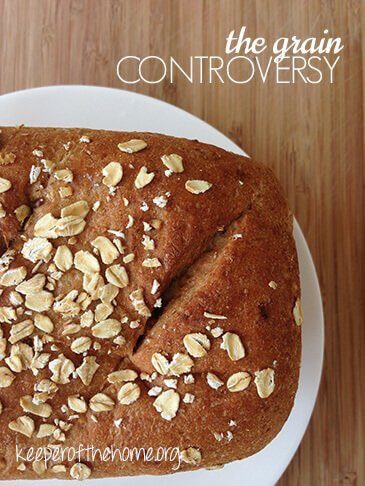
Other posts in the series:
Real Food Made Simple: A Beginner’s Guide to Eating Better
Cutting Your Kitchen Prep Time in Half — Or More!
Confessions of a Formerly Picky Eater
Second Steps Towards Eating Real Foods: Switching Your Food Sources
Sweeteners: How They Affect You, Which Ones are Best, and How to Use Them
Simple Steps to Begin Cooking Homemade: Pantry Staples
5 Strategies to Help Your Husband and Kids Transition to Real Food
Finding Real Food in the Grocery Store
20 Easy Real Food Switches and Substitutions {with Free Printable Chart}
First Steps to Eating for Fertility
Keeping Costs Down in a Real Food Kitchen
5 Ways to Get More Fruits & Veggies into your Diet
Food Is Not Cheap: 4 Steps to Budgeting in Real Food
Simple Steps to Begin Cooking Homemade: Baked Goods
Simple Roast Chicken (And Fabulous Side Dish Recipes!)
17 Homemade Spice Mixes {with Recipes & Why You Should Use Them!}
5 Ways Green Living and Real Food are Connected
Simple Steps to Begin Cooking Homemade: Soups, Sauces, and Simple Dinners

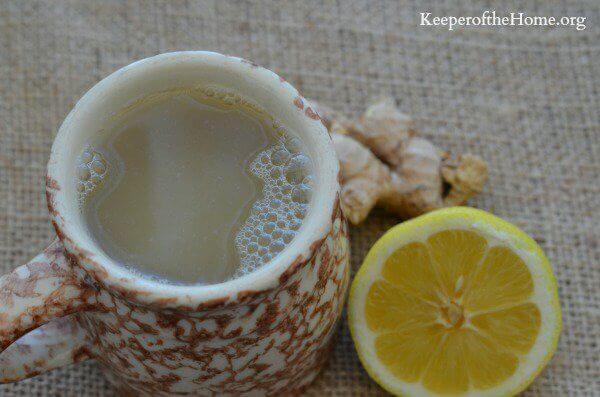
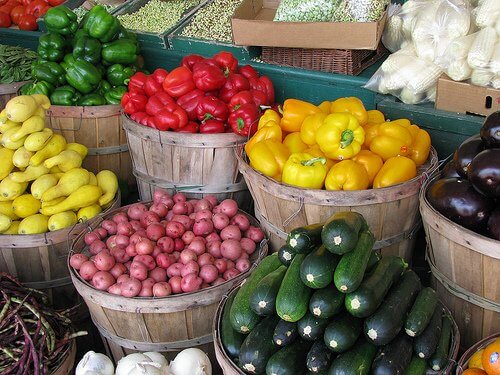
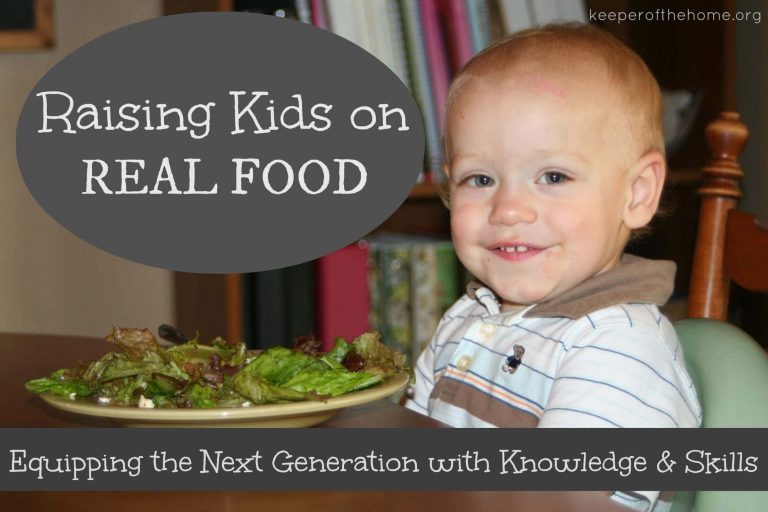


Thank you for one of the most balanced discussions I’ve read on this topic!
Thank you for such a concise and balanced look at grains! We are also enjoying the benefits of traditional sourdough methods for our grains at our house.
We are just beginning a journey that will be low or no grain. I am trying to educate myself on which grains will be best for my (grain intolerant) daughter, who has rhumatoid issues. I look forward to your advice and counsel about this issue, since you’ve already made the transition. Which grains would be best for her? Which ones should we avoid? Where can we find the best grains for her diet? I definitely need help in this area. Thank you!
Hi Mary Jane,
That is really tough. I would have recommended rice, because it is low in phytic acid and gluten-free, but it’s recently been found to contain arsenic. Really it will depend on what she tolerates best. Try them one at a time and wait 3 – 4 days to see a reaction. Make sure you soak, sprout, or use them for sourdough. There are some links in the post to help with that.
for those that are going grain free, Wheat Belly is the book that will help you understand why WHEAT is bad. Other grains aren’t really bad, just have a higher carb count. Wheat is not bad just because of the gluten or phytic count. it is the protein gliadin. it has the same effect on your brain as a drug does. this has been proven in many studies, years before the drs started pushing whole grains. wheat also is addictive, is an appetite stimulant, and is the cause of many many sicknesses. It is the only food that gives withdrawal symptoms (same as a drug does), and also the drug given to stop the effects of a drug on the brain, can be used with wheat. It gives you brain fog, fatigue, etc. I don’t think all grains are bad, but wheat is definitely not good for you. however, if people choose to eat it, then that is their choice. We found on our very tight budget, that we can eat grain free and still be pretty cheap, because we no longer crave food all day. our children aren’t begging for food all day, and they don’t even ask for food before bed like they used to. we eat less at meal times, because we are satisfied a lot easier/sooner. and we don’t spend any more on groceries then we used to.
I have started to decrease gluten in my diet by 50% or more. Right now I switched to sprouted breads (I have not tried using sprouted grains in my cooking and baking yet, I am buying Jack Spratts’ and Ezekial bread). I already have cut out processed sugar.
I am not planning on giving up grains anytime soon, but am eating more rice, quinoa, organic oats, etc. than I have ever eaten before. I am also trying the gluten free items at the store — for pancakes, pizza crusts, etc. These are already “prepared” in terms of just being a mix that I make, vs. me doing it from scratch, but at this point in my life I don’t have the extra time to do it from scratch.
I plan on making it a lifestyle change, no white breads, heck, no whole wheat bread even, unless they are made from sprouted grains (which contain wheat, just sprouted wheat). So I look forward to how my energy levels will change this year.
Thanks for the article! I had to tweet to all my followers!
We’re at a bit of a crossroads in our home regarding grain consumption. My son and I have been gluten-free since last February, when I was diagnosed as gluten-intolerant. That said, I’m noticing that my son’s behavior (I have some concerns about sensory processing, but we are waiting until his second birthday before considering having him evaluated) tends to be better on days that are light on grains… especially corn-based products.
I would love to go grain-free, and see how we do, but I’m not sure that our one-income budget could handle it at this point… plus we are currently living with in-laws while waiting for closing to happen on our new home, and we’re sharing a kitchen (and therefore meals), so there’s that to think of, too. I’m thinking that once we are in our new home, I might try a variation on the 21-Day Paleo Cleanse (I just got the book in a big ebundle sale that they had) that uses cheaper meats (because I can slice up a chuck roast just as easily as the more expensive strip or sirloin steak, etc) and then try to only consume grains that are sprouted and/or flours that have been soaked. I’m not quite sure where that puts us regarding corn (and while we consume far less pasta than we did before my diagnosis, on the merit that GF pasta is significantly more expensive, we still love to have pasta every so often), which is a major component in our favorite pastas… or where that puts us with pasta in general, since I’m not aware of any pastas made with sprouted flour that don’t contain wheat, and at this point I’m not ready to try to introduce wheat products. Maybe someday… after our guts have had more time to heal… but not yet.
So, any tips on that? Is there a way to properly consume corn? Am I forever cursed to not be able to eat the amazing sweet corn from the farm stand a half-mile from my house? Are we done with pasta?
Hi Hannah,
Corn seems to especially be a problem. It is high in phytic acid and it is very difficult to reduce it. We used to buy organic corn chips and have taco salad several times a week, until we noted our youngest seemed to be having an issue with that (he was EBF at the time, so through me). There is a way to soak corn in lime water (white powdered lime, not lime juice) to help break it down but obviously this doesn’t work on sweet corn. Believe me, we LOVED corn too…but it wasn’t worth it once we saw how everyone was behaving and feeling while on it. Whether you want to have an occasional “corn treat” and whether or not it is worth it to you is up to you to decide.
I don’t think wheat is nearly as big a problem as corn, honestly. Wheat is easy to reduce the phytic acid through traditional preparation methods. It’s just gotten a bad name because unsoaked wheat is so pervasive in the American diet. There is brown rice pasta, and brown rice is naturally low in phytic acid, so we do this sometimes. Of course, any grain can affect the gut negatively if you are in a healing phase.
The two that I have found we need to stay away from most are corn and oats since both are difficult to reduce the phytic acid. Most others we do fine if soaked/sprouted. My husband is currently grain-free though as he is dealing with chronic yeast and doesn’t tolerate grains (or sugar, or fruit) very well at all. It works for us to have him grain-free and the rest of us not, and I sometimes eat meatless meals (which he can’t) in order to keep costs down. It’s all a balancing act, figuring out what works for your bodies and your budget.
Thank you, Kate. I’ll have to look into the powdered lime, but yeah, it sounds like my options are pretty limited when it comes to corn. Maybe I’ll try to do some research into whether or not heirloom varieties are as high in phytic acid as the “mainstream” ones. I know that wheat has been bred for high gluten content over the years, and that ancient wheat contains less of it… maybe corn has a similar story?
We have had the brown rice pasta, but none of us really enjoyed the texture of it. That’s why we’ve been using corn pasta or corn/quinoa combination pasta. That said, in the past couple of weeks, anytime we’ve had pasta, I’ve made my son Tinkyada’s rice pasta while we ate the other brand, because I thought he was having issue with it.
I had forgotten about oats, actually, because I’ve cut it out almost completely, too. Baked oatmeal was a main go-to breakfast around here, using Bob’s Red Mill GF Oats… and then I realized that they were goign through my son almost undigested, and giving him verrrrry loose stools… plus he was waking at night a ton, gassy. So you’re saying that soaking oats in yogurt/kefir or another acid medium doesn’t really do much to reduce the phytic acid? 🙁 Hm. I was hoping to maybe try to convert my baked oatmeal recipe using soaked oats … ah well, we’ll see when the time comes.
I know just from going GF that any change in diet is a journey… I just need to try not to be overwhelmed when trying to fit it into the budget! 🙂
Oh, one last question (sorry to be rambling so much!)… do you recommend soaking the “lesser-known” flours, such as millet, teff, sorghum, etc? Do you know of any websites/books that detail the phytic acid levels in them? I have a gluten-free waffle/pancake mix that I make, that uses primarily sorghum, with some teff, almond meal, and tapioca thrown in for good measure. Wondering if I should be soaking that, too, when the time comes…
Interesting that you mention corn…
My daughter stopped gaining weight at about 2 months of age and we tried all sorts of thing to get her growing again. I eliminated dairy (which helped with her vomiting), wheat, soy from my diet (she was breastfed). Tried all the typical solutions for reflux, include several medications. And nothing worked. She didn’t gain a single ounce in 5 weeks. It was very frightening because she was so young. After doing blood tests and medical imaging to see if there was a physiological problem and that too coming back negative, I asked the pediatrician in desperation, “what else can I elimininate??” She said, “maybe corn”… Lo and behold, that very week she started gaining weight!
Thank God for a intuitive and supportive pediatrician who fully supported my breast feeding. Many people suggested just going to formula, which would have been so harmful to her health as they all contain corn. It is main ingredient in all the dairy free brands, which we would have used due to her reflux/vomiting.
Thank you so much for your advice. I do have sourdough starter. I need to get to a whole foods shop to see what I can find in the way of the flours and grains you have listed in some of your other posts. This is definitely going to be an adventure!
I loved the information in this blog! My husband, son, and I have been starting to learn more about our diet especially in relation to the historical way of food preparation and our modern quick and often detrimental way of eating our food. Soaking grains is mentioned in the book we bought that is based off of Weston A. Price’s findings. I’m so encouraged that so many others are starting to look at the way we eat and the way we should be eating and preparing our food. Thank you again! I’m heading over to Modern Alternative Mama to check out your blog!
Kate, We often do quinoa as our grain here, because my son is Celiac… that said, i do still enjoy eating wheat from time to time, BUT it really throws my Blood sugars for a loop. I’m curious to see if soaking/sprouting will make a difference in that area. We use a lot of coconut flour too here, since we can’t do nut flours as my son is also treenut and peanut allergic — we had started to incorporate organic corn products back in, but it looks like we’re going to have to pull it out again. 3rd night in a row, up with our itchy, allergic boy…. sigh… it’s a battle
I love this post. We take a “soak most, eat few” approach. Generally we soak or sprout any grains we plan to eat, but surprise pancakes happen, and we don’t eat grains everyday.
My daughter is allergic to wheat, white sugar, oranges, bananas, & coconut … so a year ago we basically ditched breads & pastas all together … Yes, rice pasta is readily available but the texture is funky (my daughter’s word) … We use cautiously use spelt flour (at most once a month as it is a distance relative of modern day wheat), organic oats & organic brown rice … There are three of us in the family, I also buy organic whole grain breads for my husband … We did worse when we tried to cut grains altogether so we now eat rice 2-3 times per week & other grains 2-3 times per month … This is what has worked for us & I agree that every family situation is going to be different so each family needs to make the choices that work best for them.
–Tyg
Thank you for the great article! It was very well thought out and easy to understand. I suffer from Ulcerative Colitis and am currently grain free and following the Specific Carbohydrate Diet. Since starting the diet four months ago, I have been symptom free and feeling great! This article was helpful though in regards to trying to decide how to feed the rest of my family. I really appreciate you sharing your balanced approach to eating grains!
What a terrific and well articulated post, Kate! This is exactly my thoughts on grains – a well-balanced, low grain diet is what we follow because it’s what works for our family on many levels health, budget and practically. I appreciate the time and wisdom you put into researching and writing this post an you can be certain I’ll be sharing it with my reader friends. Lots of blessings, Kelly
Oops, sorry about the typos – my fingers fly faster in the mornings 🙂 Thanks again for this great post!
Thank you so much for your well rounded post. So many people feel strongly in each direction. I think you pointed out nicely that it is an experiment of one. It is how you feel. I went completey grain free over a year ago and I have never felt better. A few months ago I fell off the wagon, so to speak, and was reminded how badly I feel on grains. It just takes a bit of time to find out what works best for you and your family!
Hello, as a student of hollistic nutrition I was surprised to see that Omega 6 fatty acids were labelled as “bad”. Is there any way I can see the source of this information? Now, as in all things, you must eat in moderation but omega 6 lowered bad cholesterol and raises good, especially when combined or balanced with omega 3 fatty acids. Seeing as I am still learning (plus the fact thatou need to know the opposition in you field of study) I figured I would request a link or an explanation on your thoughts.
I think it’s more just a matter of the wording… they’re not “bad”, but we tend to get too many of them in modern, Western diets. Our ratio of omega-3 to omega-6 is highly skewed in the direction of omega-6. For most of us, we need to try to get less of those, and focus hard on eating more omega-3, to improve our ratios. But, both are still necessary in the body, it’s just that our diet makes it easy to consume way too many omega-6 and completely not enough omega-3. Hopefully that explanation helps a little. Although, I’m not the writer of this particular article, so Kate may want to weigh in with her own thoughts as well. 🙂
Well, yes, omega-6s are good for us, and actually we need more of them than omega-3s. But we also tend to get too much of them and get them more easily because of all the vegetable oils in our diets. I am concerned that if a family is relying very heavily on nuts, especially if they don’t eat much seafood, that this would contribute to the imbalance. I think it’s something that people who are grain-free need to be aware of so that they can make smart choices in alternative flours and balancing baking with other foods.
Thank you for this articulate and objective post about grains. People are all fanatic about this, whether they are as essential as oxygen to survive or the devil’s food. It’s difficult to find somebody with a reasonable view on the topic!
My 3yo daughter has been on GAPS for 6 months for her autism but because of her severe egg and dairy allergies this led to eating way too much meat (because all she could have was veggies and meat!) and it has damaged her liver – we’re at a crossroads too and decided re-introducing grains, so far just quinoa and potatoes – all traditionnaly prepared. And it is definitely helping her. Very slowly though and we will need to support her liver in different ways, but that’s another story.
It’s so difficult figuring what is suitable and what’s not – I find it an exhausting trial and error process, and it really shouldn’t be.
That is a great article to pass on to someone who asks me why we’re cutting out grains or only eating sprouted ones! Thank you!
Very informative, thank you! We have been strictly gluten-free for four years now, but we do use non-gluten grains without problems. I love quinoa, millet and teff in both whole form and as flours, but I also use other grains that are gluten-free. I’m beginning to experiment a little with sourdough-type dough made with gluten-free flours. I hope to have success one day!
Wow this was very informative. I’m going to look at my families diet! Thanks
I very much enjoyed the post. However, I, on the other hand, am at the other end of the spectrum. We eat plenty of grains. Our main condumption of grains are things like Quinoa, Bulghur, wild rice etc. I do bake my own Whole Wheat/Quinoa/Flax bread weekly. We are lucky that our family does not have this gluton alergy that so many people have. As a vegetarian, I feel whole grains are 2nd in line with beans (veggies and fruits being 1st) for a complete meal. I think the best thing you said in your post is that it is different for each family. There is no one right answer and it will look totally different in each household. Thnaks for a great post!
Your post is a great primer on the grain controversy. I still have a lot to learn on the topic, so your recommendation to take an individualized approach is very encouraging.
I am gluten free due to Celiac disease. However, since I have been gluten free, I started up on reading about grains and discovered that a low grain diet is best for me. I get my fiber from fruits and veggies. We do eat brown rice in our home, and quinoa. Very rarely do I make a baked good with sorghum. I think that we each need to do what is best for us, but I do think an excessive amount of grains isn’t good for anyone’s digestive system. Wonderful post.
LOVE this post! Thank you! **After years of struggling with several chronic health conditions, and then seeing these same conditions show up in our children, we consulted a naturopath who ran quite a few ‘out of the ordinary’ blood tests that revealed that for many years, we have probably been battling celiac issues rather than what seemed to be the issues at hand. Between my husband and I, we have issues like IBS, psoriasis, fibromyalgia,…..and we are now seeing issues crop up in a few of our children. We have recently been transitioning to being a gluten-free home (low grain) and just praying about how God will provide. I too believe that what is best for one family might not be best for all, in addition,….for every family, things could change at any time! Thanks again! :o)
We have eliminated most of the grain from our diet as three of my children do not do well with it. How we all miss it still after a few years from it. It is just easier in general to have bread in our diet. Jesus ate bread so I would say it is not evil.
Thanks for this post – it was great and very helpful.
Best post I’ve read by you…very well-articulated and objective! Thank you!
Katie, thanks so much for such an informative, balanced post! I started my journey to a diet of “real food” about a year ago and have often been confused/overwhelmed by all of the conflicting information out there about grains (and other stuff). I have soaked, but currently am not…but was just thinking this morning that I probably should again. Thanks for the nudge 🙂
I love this balanced perspective. I believe that it is a mature approach to nutrition in general. When someone finds help with a certain nutritional approach, they often think that everyone needs to adopt the same eating plan. As you shared, one approach does not fit all, though certain principles always apply.
Thank you for the informative, balanced approach to this controversial subject. The strong feelings associated with the subject make me want to run and hide sometimes; so thanks for being a logical voice who recognizes that different things will be right for different situations.
I use grain a lot in our diet because none of us have trouble with gluten. My main reason may seem strange for its philosophical nature, but I do so to try to wisely use the world’s limited resources. Jesus came to the poor and told us to remember them. For me, it helps to remember the poor by cooking a diet that involves elements of their food. Our budget doesn’t allow the removal of grain and most of the world’s population has even less chance at it than I do. By keeping grocery costs down through getting complete proteins from sources other than meat and dairy, I hope to keep resources free to give.
That said, I definitely recognize that my situation is different than others and that each must do what is best for her family; also that Jesus calls us to different ways of living out His words.
Thanks again for your thoughts.
This is great! I’ve been wondering about all the controversy and have friends firmly on both sides of it, but haven’t had the time to really look into it. Thanks for all the information, very helpful!
Fantastic post! Thanks!
I have Celiac disease (as does my mother and brother), so I avoid any grain with gluten. My husband doesn’t eat GF. I’m slowly trying to convert our eating habits to a more healthy, organic diet. I’d like to quit buy my husband’s bread and make it at home with whole, organic grains. I can’t see us going grain-free, but as time passes buy I would like for us to head in the direction of organic whole grains.
I have been having gut issues and brain fog for years! I watched a documentary called, “Forks over Knives” a little over a year ago and it changed my world! I had been battling sinus issues and within 24 hours if giving up dairy, my sinus issues were completely gone! I have been eating a vegan diet for over a year, but recently started having increased brain fog. I tried eliminating gluten and that seems to be the culprit. My concerns are not only that these issues also may be affecting my children, but the new learning curve seems so overwhelming. I really appreciate this post and am looking forward to reading more from your links!
Hi Kelly,
Me too. And giving up store-bought dairy had an immediate positive effect on my sinuses as well. I get dry red eyes and a stuffy nose whenever I have some. Raw dairy, though, I found to be a completely different story! Not only doesn’t bother me but makes me feel great! If you are interested or really miss dairy products, check out http://www.realmilk.com for more info! A lot of mothers swear by raw milk for their kids, too.
Thank you for this balanced post I can’t help but feel like “grain-free” is a new diet catch-phrase that will soon go the way of “fat-free” and “low-carb” when the next big healthy eating trend sweeps in. I don’t believe that any one food group is inherently “bad.” I am learning more about traditional foods and preparing grains in that manner, but whole grains have always been a part of our diet. (Other than a brief elimination diet I went on that did nothing for me.) Honestly, I could not afford to go completely grain-free or legume-free. But I can afford a balanced diet of mostly organic foods by including them in moderation.
I feel you should eat the highest quality food you can afford and do what makes you feel best! (And don’t assume that if a food doesn’t agree with you then it is bad for everyone else as well.) Humans have survived and thrived on various different diets throughout history.
Also, I wonder what our individual genetics have to do with our tolerance/intolerances to certain foods. For example, indigenous people in the Americans traditionally consumed corn while rice is associated with Asia. Perhaps there is something to our ancestry and genetics effecting what diet makes us feel best.
I love your attitude that we should go with what works for us personally, I find I go we’ll with wholemeal pasta but quinoa doesn’t agree with me at all 🙂
I agree, I feel that diet is never one size fits all. And I would like to comment on “there’s nothing in grains that isn’t in anything else” you could say that about any food. There is no unique source of any vitamin or mineral, so technically, you could say that you don’t need veggies, because vitamins and fiber are also found in fruits and nuts
Hi! I echo the thoughts about the thoughtful post! I thought you might be interested in this interview that I did last weekend on this topic! http://youtu.be/khVSJB4iuY0 Blessings on your wonderful site! Hope